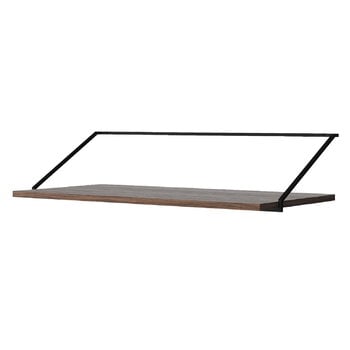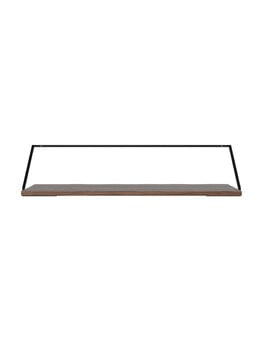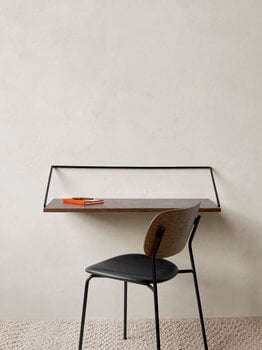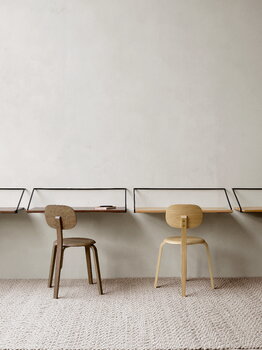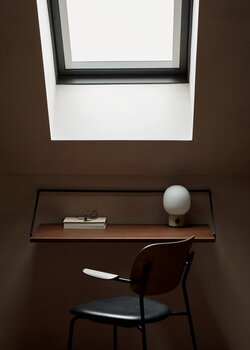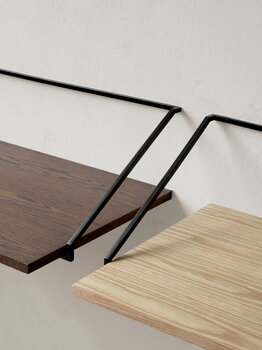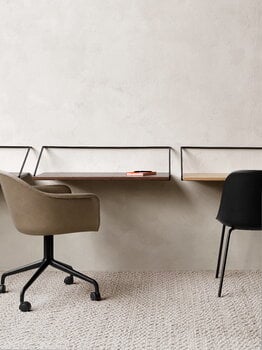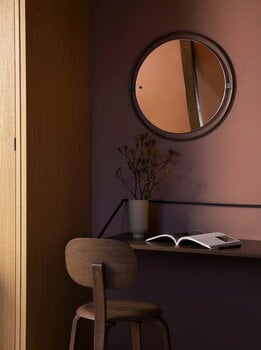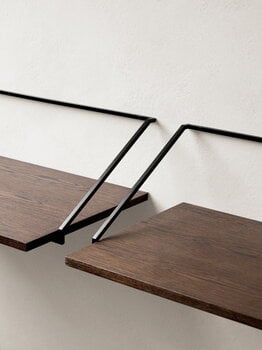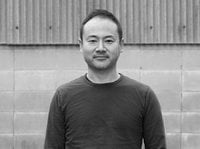Audo Copenhagen's Rail desk, designed by Keiji Ashizawa, is a multifunctional piece that adapts to several functions. Inspired by the realm of architecture and the designer’s background in steel working, the Rail desk is a practical choice when used as a desk, counter or shelf for storing books. Whether placed in the bedroom, living room or study, Audo Copenhagen's Rail desk can be hung at whichever height you choose. The minimal look of the steel bracket is juxtaposed with the natural feel of the wooden platform, resulting in a delightful contrast that will draw in gazes for years to come.
Rail desk, dark stained oak - black
Audo Copenhagen
Description
Audo Copenhagen's Rail desk, designed by Keiji Ashizawa, is a multifunctional piece that adapts to several functions. Inspired by the realm of architecture and the designer’s background in steel working, the Rail desk is a practical choice when used as a desk, counter or shelf for storing books. Whether placed in the bedroom, living room or study, Audo Copenhagen's Rail desk can be hung at whichever height you choose. The minimal look of the steel bracket is juxtaposed with the natural feel of the wooden platform, resulting in a delightful contrast that will draw in gazes for years to come.
Product details (7)
- Colour
- Oak, black
- Width
- 36.22 in (92 cm)
- Depth
- 17.72 in (45 cm)
- Height
- 8.35 in (21.2 cm)
- Material
- Oak veneer, MDF, steel
- Weight
- 18.74 lbs (8.5 kg)
- Care instructions
- Should be cleaned using a dry or well-wrung cloth.
Designer
Keiji Ashizawa (b. 1973) is a Japanese designer based in Tokyo, whose designs are rooted in the attempt of realizing the full potential of each material in relation to the function of both the material and the product. Based on this idea, the simple, refined and light shapes typical of Ashizawa’s designs are formed organically during the design process. A particular influence for Ashizawa’s approach to design comes from his ten years of experience as an architect and a steel fabricator before his career as a designer.
View all productsReviews (0)
Sustainability
The Product Sustainability Framework, our criteria of sustainable design, helps you find the most sustainable products in our selection. Read below which sustainability criteria this product has met.
Working conditions & labour 7/9
-
Equal opportunities for all employees
-
Commitment to UN Global Compact, fair compensation for all employees
-
Corporate responsibility requirements defined and communicated for suppliers
-
Systematic work for improved inclusion and well-being in the workplace
-
Transparent supply chain
-
Suppliers' compliance to a code of conduct ensured
-
Compliance to the UN Guiding Principles on Business and Human Rights ensured in the supply chain
-
Direct suppliers audited and certified
-
Support for community involvement in the supply chain
Eco-friendly production 8/9
-
Fair and resource-wise water-use in production
-
No incineration or landfilling of returned items
-
No use of endangered species as materials
-
No direct environmental emissions or waste (excl. GHGs) from production
-
The sustainability of direct suppliers' production is addressed and monitored
-
Production and material sourcing that respect biodiversity, animal rights, and natural ecosystems
-
Material-efficient and ecological packaging
-
No potentially harmful chemicals used in own production
-
Positive impact on nature’s well-being through operations that regenerate natural ecosystems
Climate impact 4/8
-
Company's direct greenhouse gas emissions identified and commitment to reduction
-
Product's carbon impact identified and commitment to reduction
-
Guidance on energy- and eco-efficient use of the product
-
Carbon footprint of the product calculated and goals set to reduce it
-
Contribution to climate initiatives beyond the brand’s direct operations
-
Low-carbon or compensated transportation
-
100 % renewable energy in own production and operations
-
Carbon neutral or carbon negative product
Sustainable materials 6/6
-
Sustainable and long-lasting material choices
-
No harmful or hazardous substances
-
Responsible raw material sourcing and production
-
Materials suited for circularity: monomaterials, recyclable finishings, renewable or recycled contents etc.
-
Ecological materials: natural, biodegradable, recyclable or recycled contents
-
Outstanding materials in terms of innovativeness, responsibility, sustainability and circularity: local production or sourcing, 100 % recycled content, C2C-certification etc.
Circular design 4/5
-
High aesthetic quality promoting long-term use of the product
-
Technically durable product design and material choices
-
Design for enduring life-long quality
-
Design and support for product maintenance, repair and upgradability
-
Innovative circular design solutions: circular service system, resale platform, remanufacturing, collection of used products, etc.
Chat to us online
Please enable functional cookies to use this feature. You can change your cookie settings at any time.
